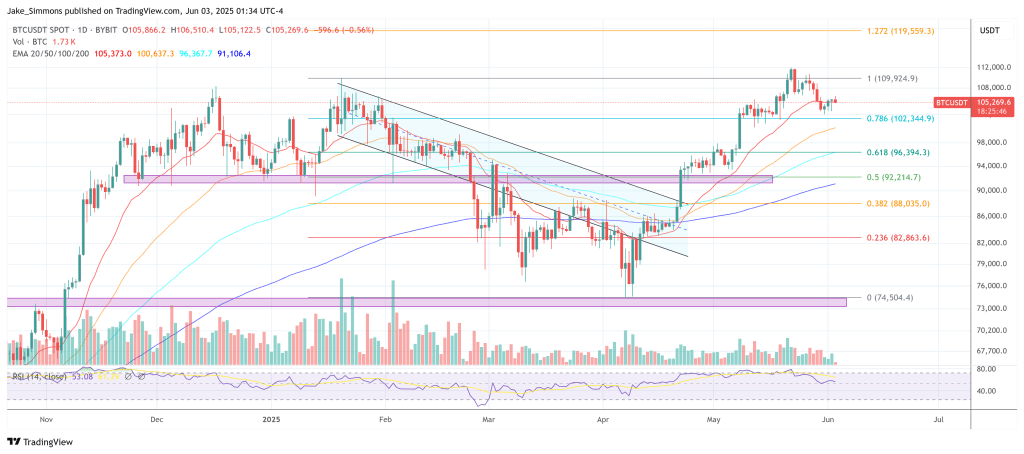Russia has just dropped a bitcoin bomb – while the United States debates

SBER, the largest universal bank in Russia which belongs to the majority by the State, began to market a new class of structured obligations whose payments are indexed to the American price of Bitcoin and on the movements of the dollar against the ruble, opening a lane officially regulated in the pre-eminent cryptocurrency of the world for qualified Russian investors.
Russia is launching bitcoin bonds
Notes, announcement In a press release on May 30, rubles were released and settled entirely inside the compensation and domestic deposit infrastructure. SBER has told customers that the instrument “provides investors with two return mechanisms: they can gain income from future American value changes in Bitcoin and a possible strengthening of the US dollar against the ruble”, while requiring neither a cryptographic portfolio nor an interaction with “unregulated foreign platforms”.
SBER initially distributes counter titles to a selected group of qualified investors, but intends to list the subsequent tranches of the Moscow Stock Exchange (MOEX) “to ensure transparency, liquidity and convenience for a wide range of qualified investors,” said the bank. He also confirmed that Bitcoin in cash contracts will appear on its Sberinvestments platform on June 4, the same day as Mox should launch its own contract.
The beginnings only occur for days after the Russian bank has softened its long -standing opposition to the instruments linked to the crypto. On May 28, the central bank said that brokers and exchanges can offer non-deliverable derivatives and structured products linked to digital assets to “qualified” markets on the market, did not provide any change in physical cryptocurrency.
Vice-President Anatoly Popov has supervised SBER's obligations as the first tangible application of the new regime, promising investors “practical and secure exposure to cryptocurrency assets-without direct cryptocurrencies, while fully containing regulatory requirements on Russian infrastructure”.
Sber's decision also reflects the wider strategy of the bank's digital assets. Over the past four years, he has built an authorized blockchain network, experienced with a “Sbercoin” at the cutting edge of ruble and integrated metamasque connectivity, positioning itself as the national tokenized finance champion, even if international sanctions have reduced its foreign operations.
Structurally, the new bond operates as a synthetic calling propagation. The coupons payments refer to the variation as a percentage of the price of the dollar BTC over a predefined period, plus any assessment of the FX rate in dollars / rubles, subject to ceilings set out in the supply circular.
Because the regulations are in rubles via the national regulation of Russia, investors remain within the local legal perimeter and avoid the complexities of guard and tax of Bitcoin's holding abroad. Price details have not been disclosed.
The United States is late (but could still win)
Market professionals consider the product as a watershed. “I do not think that most bitbonds will do for Bitcoin,” wrote Marty Bent on X. “Bitbonds create a avant-garde duration curve which brings a certainty that X The amount of bitcoin is out of the market for a while.”
The launch also triggered a geopolitical comment: “It seems that Russia comes from the flegery bitbonds through Sberbank-while the United States continues to hang out,” published the British Pseudonym Hodl trader, while analyst Justin Bechler maintained that the instruments give “Brics Soverreigns and instant access institutions Zero friction ”.
The CEO of Bitcoin magazine, David Bailey, added: “We need Bitbonds in America now. Like now.”
In Washington, the idea of bitbonds only exists in the form of white paper. Two months ago, Bitcoin Policy Institute (BPI) published “Treasury bonds improved by Bitcoin: an idea that the time has come”, arguing that the US treasure should issue up to 2 billions of so-called bitbonds carrying a 1%coupon. 10% of products – about 200 billion dollars – would be used to buy BTC for the newly created Bitcoin Strategic Reserve; The rest would refinance conventional debt.
“Over a period of ten years, this represents nominal savings of $ 700 billion and a current value of $ 554 billion,” wrote Andrew Hohns and Matthew Pines co-authors, adding that the integrated BTC call option could “challenge up to 50 dollars of federal debt by 2045 if the historical growth rates. Speaking during the Bitcoin for America forum of BPI in March, Hohns considered the concept as “a win-win-winner of loan costs, a significant sovereign bitcoin reserve and participation in the increase for taxpayers.”
However, the proposal remains in limbo. Treasury officials did not comment publicly, and although several pro -bitcoin legislators – notably the Senators Cynthia Lummis and Bill Hagerty – say they study the framework, no habilifying legislation has been introduced.
Technically, the Russian product and the BPI plan pursue the same objective – to advance the regulated BTC regulated bond markets, but by opposite roads. The SBER structure is a note called in ruble whose coupon is synthetically linked to the BTC / USD / USD / RUB spot; The regulations are entirely in Fiat and erased by national infrastructure.
BPI's vision creates security of the US Treasury worded in dollars, paying a coupon lower than the market but incorporating an option to buy Bitcoin; 10% of the principal would buy – and permanently warehouse – physical BTC. Indeed, Sber offers an exhibition to investor prices while the BPI wants the sovereign himself to have parts.
At the time of the press, BTC exchanged $ 105,269.

Star image created with dall.e, tradingView.com graphic

Editorial process Because the bitcoinist is centered on the supply of in -depth, precise and impartial content. We confirm strict supply standards, and each page undergoes a diligent review by our team of high -level technology experts and experienced editors. This process guarantees the integrity, relevance and value of our content for our readers.





